Related Research Articles
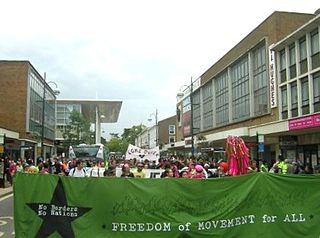
The No Border Network refers to loose associations of autonomous organisations, groups, and individuals in Western Europe, Central Europe, Eastern Europe and beyond. They support freedom of movement and resist human migration control by coordinating international border camps, demonstrations, direct actions, and anti-deportation campaigns.
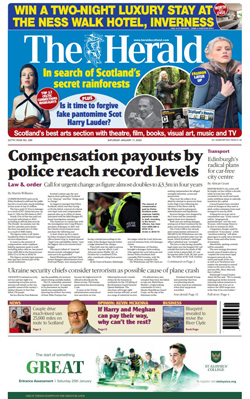
The Herald is a Scottish broadsheet newspaper founded in 1783. The Herald is the longest running national newspaper in the world and is the eighth oldest daily paper in the world. The title was simplified from The Glasgow Herald in 1992. Following the closure of the Sunday Herald, the Herald on Sunday was launched as a Sunday edition on 9 September 2018.

Drumchapel, known locally as 'The Drum', is a district in the north-west of the city of Glasgow, Scotland. It borders Bearsden to the north-east and Drumry to the south-west, as well as Blairdardie, Garscadden, Knightswood and Yoker in Glasgow to the south; land to the north is undeveloped and includes the course of the Roman-era Antonine Wall. The name derives from the Gaelic meaning 'the ridge of the horse'.

Peter Mullan is a Scottish actor and filmmaker. He is best known for his role in Ken Loach's My Name Is Joe (1998), The Claim (2000), and all three series of the BBC comedy series Mum, in which he starred as Michael.
Unity is a volunteer-run organisation which provides support for asylum seekers and sans papiers in Glasgow, Scotland. The Unity Centre has been open since 2006 and is situated in Ibrox, near to the Home Office Immigration Centre.
The Glasgow Girls is a group of seven young women in Glasgow, Scotland, who highlighted the poor treatment of asylum seekers whose rights of appeal had been exhausted. In 2005, the group campaigned against dawn raids, raised public awareness, and found support in the Scottish Parliament. Their story has been told in a musical and 2 documentaries.

Gartnavel Royal Hospital is a mental health facility based in the west end of Glasgow, Scotland. It provides inpatient psychiatric care for the population of the West of the City. It used to house the regional adolescent psychiatric unit but this has recently moved to a new psychiatric unit at Stobhill Hospital. The Hospital is a venue used by the Mental Health Tribunal for Scotland. Some parts of the hospital are classified as a category A building and are also deemed at risk.
The Ay family are Kurdish asylum seekers who became the centre of a controversy in 2003 surrounding the policy of locking up children in high security immigration detention centres in the United Kingdom.
John Fingland Mason is a Scottish National Party (SNP) politician who has served as the Member of the Scottish Parliament (MSP) for Glasgow Shettleston since 2011.
Robina Qureshi is a Scottish human rights campaigner. She is a critic of the asylum policies of the United Kingdom, and has campaigned to stop inhumane treatment and close detention centres for asylum seekers.
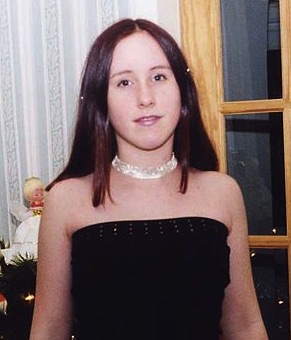
Nicola Ann Raphael was a Scottish schoolgirl who died from suicide after enduring years of bullying because she dressed in a goth style. Her death on 24 June 2001 and allegations of bullying at her school, Lenzie Academy, led to coverage in the local and national press.
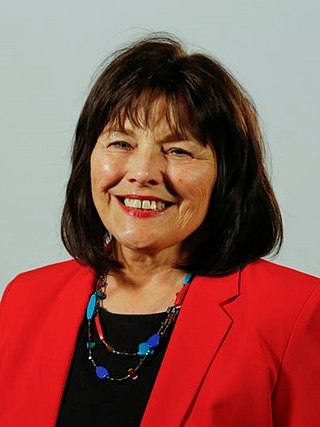
Jeane Tennent Freeman is a Scottish retired businesswoman and politician who served as Cabinet Secretary for Health and Sport from 2018 to 2021. A member of the Scottish National Party (SNP), she was the Member of the Scottish Parliament (MSP) for the Carrick, Cumnock and Doon Valley constituency from 2016 to 2021.
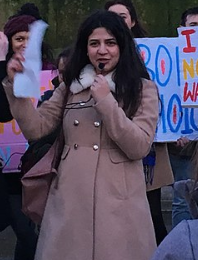
Roza Salih is a Kurdish-born, Scottish politician and human rights activist. In 2005, at the age of 15, she co-founded the Glasgow Girls with fellow pupils from Drumchapel High School. The Glasgow Girls campaigned to stop the UK Border Agency carrying out dawn raids and detaining and then deporting children, successfully preventing the deportation of their school friend, Agnesa Murselaj, a Roma from Kosovo. Salih, who was born in Southern Kurdistan, is a co-founder of Scottish Solidarity with Kurdistan.

Paul John Sweeney FIES is a Scottish politician. A member of the Scottish Labour and Co-operative Party, he currently serves as Member of the Scottish Parliament (MSP) for the Glasgow region in the 6th Scottish Parliament, elected in May 2021. He previously served as Member of Parliament (MP) for Glasgow North East from 2017 to 2019.
Cora Bissett is a Scottish theatre director, playwright, actor and musician. As a director she has created Amada, Roadkill, Grit: The Martyn Bennett Story, Glasgow Girls and Room. As an actor she had regular appearances in the television programmes Rab C. Nesbitt and High Times. She is an associate director at the National Theatre of Scotland.
Amer Jamil is an Islamic scholar and co-founder of the Solas Foundation and iSyllabus programme, the latter of which he is currently the Project Director. He holds a (LLB) law degree from the University of Strathclyde and BA (Hons) in Islamic studies from the University of Wales. He was also previously the Muslim Chaplain at Glasgow Caledonian University.

Emma Ritch was a Scottish women's rights campaigner who was the executive director of Engender, a feminist policy organisation working on women’s social, economic, and political equality in Scotland. She had been working there for 13 years when she died on 9 July 2021.

Emma Roddick is a Scottish National Party (SNP) politician serving as the Minister for Equalities, Migration and Refugees since 2023. She has been a Member of the Scottish Parliament (MSP) for Highlands and Islands since May 2021.

On the morning of 13 May 2021, two Sikh men of Indian origin living on Kenmure Street in the Pollokshields area of Glasgow were taken from their home and detained by the Home Office in a van on the street for alleged immigration violations. In response, neighbours and advocates organized a sit-in protest and surrounded the van for eight hours, during which time Police Scotland became involved, until they were released. Immigration advocates criticised the detainment of long-term residents in the community. In addition, the timing of the raid came under scrutiny as it was conducted on the dawn of Eid in a diverse neighborhood with a high concentration of Muslim residents and during the transition of government following the 2021 Scottish Parliament election. The protests also led to a broader debate over whether Scotland should be subject to the United Kingdom's immigration policies, particularly the Home Office hostile environment policy, and statements in support of Scottish independence.
Transgender asylum seekers are transgender-identifying people seeking refuge in another country due to stigmatization or persecution in their home countries. Because of their gender non-conformity, transgender asylum seekers face elevated risks to their mental and physical health than cisgender asylum seekers or those whose gender identity is the same as their sex assigned at birth, including higher risks of physical and sexual assault, torture, "conversion therapy" practices, and forced isolation. As a result, transgender people face challenges in the asylum process not experienced by others.
References
- 1 2 3 4 Marsh, Stephanie (8 March 2017). "Activist Amal Azzudin: 'As long as there is passion and courage, anything is possible'". The Guardian. Retrieved 5 March 2018.
- ↑ Katie (10 May 2021). "Amal Azzudin and the Glasgow Girls". Girl Museum. Retrieved 5 November 2023.
- ↑ Leadbetter, Russell (12 July 2014). "Man Behind the Glasgow Girls". Evening Times of Glasgow. Retrieved 5 March 2018.
- 1 2 Ross, Peter. "'They said they felt sorry for us because Glasgow was a terrible place. I wish I could tell them how wrong they were'". The Scotsman. Retrieved 10 March 2018.
- ↑ "15 Year old Mal Azzudin formed the Glasgow Girls". The Herald. 11 December 2005. Retrieved 5 March 2018.
- 1 2 "Former Glasgow Girl Amal Azzudin's heartfelt diary of working on the frontline with refugees in Greece". HeraldScotland. 11 October 2015. Retrieved 8 March 2018.
- ↑ Drysdale, Neil (21 June 2019). "Pupils celebrate Generation Change at Youth Philanthropy Initiative gathering". Press and Journal. Retrieved 3 December 2019.
- 1 2 "Long Read: Interview with Amal Azzudin". 3 January 2017. Retrieved 19 May 2018.
- ↑ "Amal Azzudin". Mental Health Foundation. Retrieved 8 March 2018.
- ↑ "Amal Azzudin". Saltire Society.org. Archived from the original on 10 March 2018. Retrieved 5 March 2018.